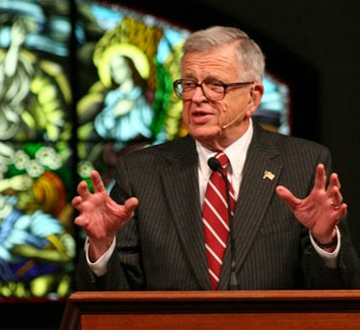Here’s what he said about the first selection from the larger translation project, Wisdom & Wonder: Common Grace in Science & Art:
Abraham Kuyper was a profound theologian, an encyclopedic thinker, and a deeply spiritual man who believed that it is the believer’s task ‘to know God in all his works.’ In a day when secular science is seeking to establish hegemony over all knowing, and when postmodern art is threatening to bring an end to art, Kuyper’s solid, Biblical insights can help to restore perspective and sanity to these two critical areas of creation.
But Chuck likewise inspired others in the quest to understand the implications of Christ’s lordship over all areas of human life. Gabe Lyons and Jon Tyson said this of Colson in their foreword to Wisdom & Wonder:
Like many, we were first introduced to Kuyper’s work indirectly through famed evangelical Chuck Colson when he exclaimed in his book, How Now Shall We Live?, that “Christians are called to redeem entire cultures, not just individuals.”
That single declaration changes everything. It reveals a truth that many Christians have forgotten, that we as Christians have a role, indeed a responsibility, to be involved in renewing every realm of the world. Nothing is to be left untouched by the transformative power of the Gospel. This was the influence of Kuyper.
And it was the influence of Colson, I would add. Colson understood himself in large part as a popularizer of Kuyper’s ideas about Christ’s lordship, common grace, and worldview.
Gabe Lyons, who is the founder of Q Ideas, also passes along a 2007 interview conducted with Chuck Colson, in which “Chuck describes, in his own words, the legacy he hopes to leave behind.” Gabe says here too that Colson’s book, How Now Shall We Live?, “changed everything for me.”
Here’s what Chuck says about common grace in that interview:
Common grace is a term that’s fallen into disuse in modern times, but the reformers understood it to be God’s grace spilled out in life for the benefit of non-believers as well as believers. Saving grace is grace which transforms us. Common grace is, to the just and the unjust alike, experienced when God’s people do what God’s people are supposed to do. It was also was used in the Reformation era as a synonym because it was less offensive than saving grace to people of the natural law.
We believe that God spoke into being the universe, and spoke to us and revealed to us the eternal, immutable laws—which go back to the beginning of creation. I think people can access those, non-believers and it’s one of the ways they know the truth. That was a little bit offensive to the reformers so they used the term common grace in lieu of natural law. But it’s the outworking of God that affects believers, as well as nonbelievers, all people in society.
If Christians are doing what they’re supposed to be doing—being the light, exercising their cultural responsibilities—then common grace is going to be shared abroad for the good of believers and non-believers.
And if you haven’t seen Chuck’s story as told through his last interview, be sure to check out “Like I Am.”
